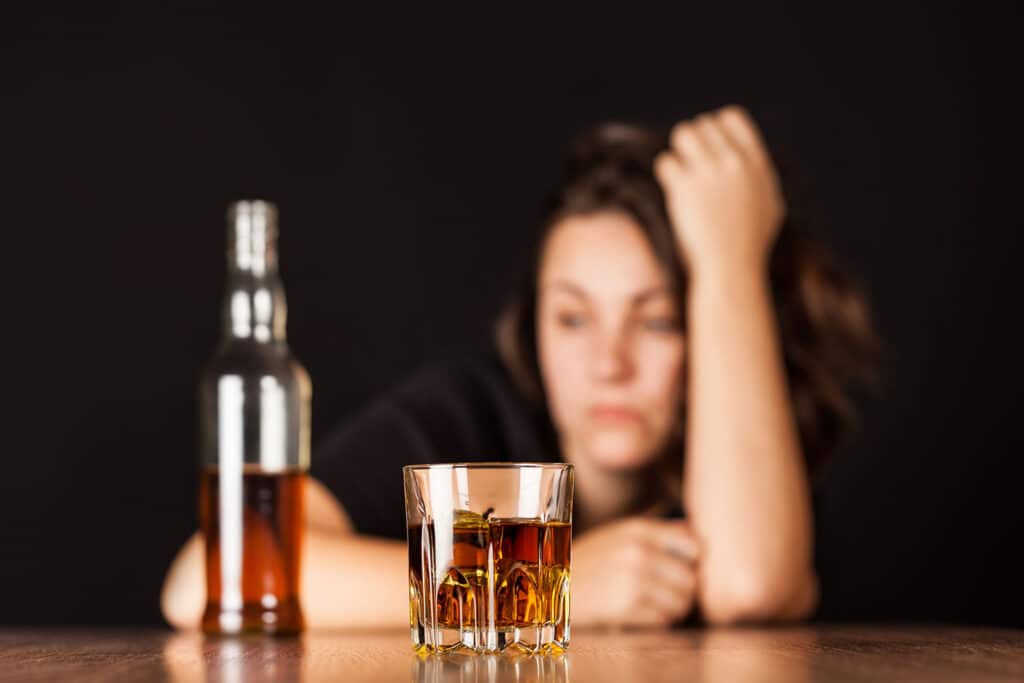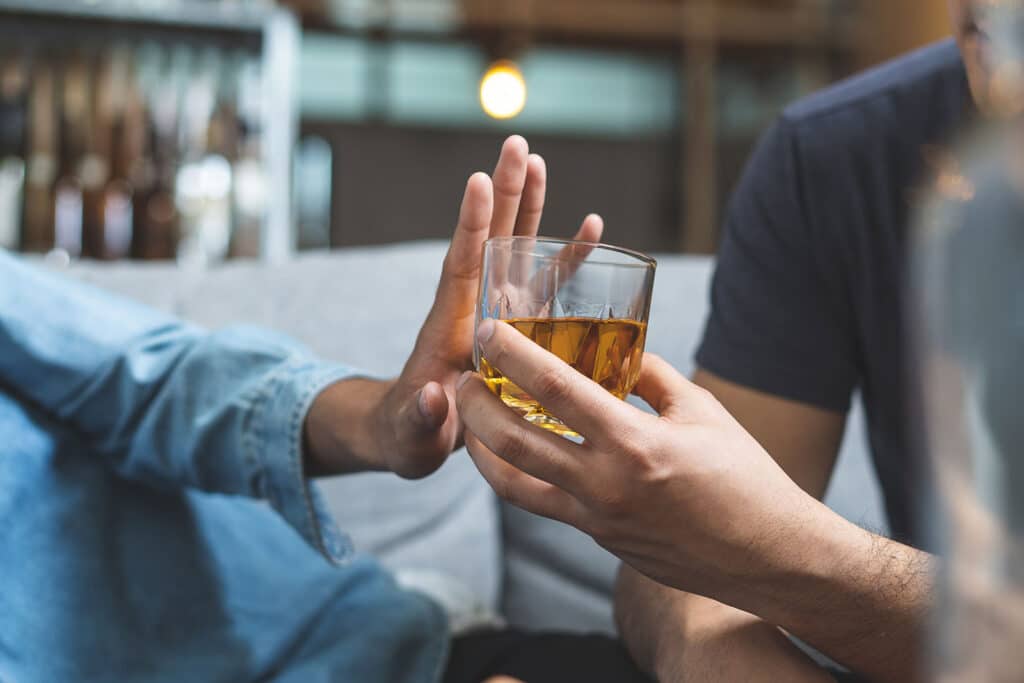Is Alcohol a Depressant?
Unlike other drugs, hard liquor, beer, and other inebriants are seldom ever demonized or considered addictive. In fact, from the age of 21 onwards, it is perfectly legal to enjoy an alcoholic beverage on occasion or even more often if one so chooses. Some might even go so far as to say that drinking has become more socially accepted in recent years. Unfortunately, this acceptance may have contributed to turning many one-time social drinkers into full-on alcoholics, not to mention making alcoholism a chronic and pervasive problem in the U.S. It should be noted that none of this is rooted solely in conjecture; several studies underscore the gravity of America’s struggle when it comes to binge drinking and full-on alcohol use disorders (AUDs).

According to a 2015 study, the most recent and relevant data available, from the National Survey on Drug Use and Health, some 16 million Americans have an alcohol use disorder. Of those, 8 percent are men, 4 percent are women, and just a little over 2.5 percent are teenagers. Many of these same individuals who admitted to abusing alcohol say they started drinking to cope with depression. But they soon found out that they were not doing themselves any favors since alcohol is a depressant.
Why Are Inebriants Considered Depressants?
One of the things that very people know about their favorite liquors, beers, wines, and other inebriants is that they are all characterized as central nervous system depressants. In plain language, this means that consuming these alcoholic beverages can slow down brain function and neural activity by enhancing the effects of the neurotransmitter gamma-aminobutyric acid (GABA) in the brain. When this happens, most people will exhibit the following:
- Slurred speech
- An extreme lack of coordination
- Hallucinations
- Delayed reaction times and abilities
- Depression
The process whereby inebriants affect the central nervous system helps to explain why many people who binge drink or otherwise drink excessively often behave irrationally. It also explains why drinking lowers inhibitions and lends itself to people making bad decisions as they succumb to poor judgment.
Stimulating and Sedating Effects: Understanding the True Consequences of Excessive Drinking
Having detailed why alcohol is considered a depressant, let us now take a moment to discuss the stimulating and sedating effects that go hand-in-hand with it and why it is so alluring to someone wanting to free themselves from their inhibitions. Yes, along with drinking alcohol to cope with depression, many people drink to overcome anxiety or as a way to coax themselves out of their proverbial shell. And this is precisely why many ordinarily quiet social and heavy drinkers refer to alcohol as their social lubricant. In a study published by MedicineNet, researchers echoed the same sentiment. In short, they found that consuming even a modest amount of hard liquor, wine, or even beer in a group setting can help boost emotions and enhance social bonding. Of course, the feeling of being liberated from inhibition and the short-lived euphoria that comes with drinking alcoholic beverages often leads people down a path of addiction. And this is because most people develop a tolerance that requires them to consume significantly more of their preferred alcoholic beverage to achieve the same euphoria, freedom from inhibition, and comfort when it comes to social bonding. That said, the more inebriants someone consumes, the more likely they are to struggle with the sedating effects of those inebriants.
Depressants and How They Affect the Body and Mind
With the understanding that alcoholic beverages of all kinds are, indeed, depressants, let’s take a deep dive into how these very depressants affect both the mind and body. Of course, to do that, we need to know a little more about the neurotransmitter in the brain called gamma-aminobutyric acid. When someone consumes hard liquor, wine, beer, or another inebriant, the substances in those drinks bind to the GABA receptors in the brain. When this happens, it can affect people in a couple of different ways. For one, when inebriants bind to GABA receptors, it triggers feelings of calmness and sedation. Beyond that, it depresses the central nervous system, which, in turn, slows down breathing and heart rate.
Glutamate: How This One Neurotransmitter Triggers Depression When We Consume Alcoholic Beverages
Along with gamma-aminobutyric acid, the substances in alcoholic beverages also bind to receptors in the brain known as glutamate. For those not aware, glutamate is an excitatory neurotransmitter released by nerve cells in the brain. The primary role of this particular neurotransmitter is to send signals between cells, and this signaling plays an important role when it comes to learning and memory. Consuming too much in the way of alcoholic beverages interferes with this process, and for many people, it impedes brain functionality and causes memory loss. While we are on the topic, it is worth pointing out that consuming inebriants can also alter dopamine levels in the brain. This particular neurotransmitter is associated with pleasure and reward. That said, the more someone drinks, the more intense those feelings become. For many, these feelings caused by an uptick in dopamine are so great that it drives them to keep drinking despite the risk to their health.
Combining Alcoholic Beverages With Other Depressants
Sadly, excessive drinking alone is not the only problem in America. Many people who binge drink or struggle with alcoholism will sometimes take prescription depressant drugs commonly prescribed to treat anxiety and other mental illnesses with their favorite alcoholic beverages. Of course, doing so poses multiple health risks. According to most physicians and addiction experts, combining Xanax, Valium, Klonopin, and the like with any alcoholic beverage can either intensify or cause the following:
- Depression
- Dizziness
- Fatigue
- Impaired motor skills
- Feeling lightheaded
- Low blood pressure
- Nausea and vomiting
- Slowed breathing
- A lower heart rate
- Slurred speech
It is worth noting that in addition to these symptoms, combining alcoholic beverages with other depressants can trigger seizures and may even be fatal for some people. This combination can also further strain the relationships people have with their friends and family, and the same applies to relationships with work colleagues and interactions with people in general.
Final Thoughts on the Depressant Effects of Inebriants
Even if the chief objective for partaking in the consumption of alcoholic drinks is to destress, relax, or overcome inhibitions, drinking even small amounts can significantly change one’s mood, behavior, and neuropsychological function due to the impact on the central nervous system. And it is for these very reasons, hard liquor, wine, beer, and the like are all considered depressants, much like Xanax, Valium, and similar psychotropic drugs prescribed to treat anxiety and other mental illnesses.

With that in mind, if you’re among the millions of people in America struggling with a drinking problem, you should know that there is no shortage of treatment facilities that can help. For instance, many facilities offer medication-assisted detox to help ease the severe withdrawal symptoms that most people experience once they quit drinking for good, including elevated blood pressure, fever, insomnia, headaches, profuse sweating, and tremors. Many facilities also offer counseling with a licensed therapist to help individuals understand what drove them to start drinking in the first place. This understanding is critical in enabling people to achieve both short and long-term sobriety. Indeed, the journey to sobriety is long and arduous, but it is not impossible when you have help and, of course, the right mindset.


Comments